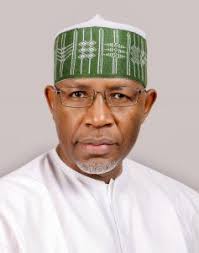The Director-General of the Securities and Exchange Commission (SEC) Nigeria, Mr. Lamido Yuguda, has listed some of the gains recorded since Nigeria committed to collaborating with the Islamic Financial Services Board (IFSB) as including improved funding of the nation’s infrastructure through Sukuk funds.
Yuguda, in his keynote address at the First Annual SEC Nigeria-IFSB International Forum on Non-Interest Capital Market in Abuja, noted that the commission and other IFSB members in Nigeria had greatly benefited from the IFSB’s services, including capacity building, technical support, and global visibility.
While restating the commission’s full commitment to fostering market development and innovation, maintaining a regulatory framework that ensures stability and fairness, the capital market regulator pointed out that the collaboration with the IFSB was a testament to the management’s belief in open discussions and the exchange of ideas on vital matters for the benefit of the economy and the nation’s sustainable development.
The investment expert, further pointed out that the SEC, in its continuous commitment to fostering the development of a robust Non-Interest Capital Market (NICM), was strengthening its collaboration with the IFSB given its pivotal roles in ensuring stability and resilience in the Islamic finance segment globally.
Data on the International Islamic Financial Market (IIFM) showed that in 2022 the Islamic Finance Industry had an estimated size of US$ 3.25 trillion, with global sukuk issuances valued at US$182.72 billion, Yuguda disclosed.
In Nigeria, the Islamic finance segment of the financial industry reached an estimated size of US$2.9 billion as at the end of 2022, with outstanding sukuk forming the largest part at 57 per cent, followed by Islamic banks at 42 per cent, (total assets), and the remaining 1 per cent split between Islamic funds (total assets) and takaful (total contributions).
Yuguda explained that this showed that the Nigerian market made up just 0.9% of the global non-interest market and stressed the need to boost the segment’s growth in view of the fact that the country had a large population with a significant proportion unbanked and the potential benefits for the country.
The Director-General further dislcosed that since the debut of Sukuk in Nigeria in 2017, the Debt Management Office (DMO) had raised almost N1.0 trillion to finance over 5,000 kilometres of critical roads and bridges with all such issuances oversubscribed.
The over-subscription of the most recent 6th Federal Government of Nigeria Sukuk by 435 per cent underscores investor confidence, showcasing the strategic role of Sukuk in infrastructure development and financial inclusion.
He said: “We are all aware that sukuks backed by assets promote risk sharing in high-risk projects, offer flexibility in project stages and foster public-private partnerships.
“Therefore, Sukuks are good structure for infrastructure financing, as they clear the issuer’s balance sheet of debt, given that the investors own the assets to be financed and share in the gains from such asset. This is really an attractive capital market instrument to be explored by both corporates and governments at all levels.” Yuguda added.
Noting that the non-interest capital markets have a huge role to play in the current economic program being pursued by President of the Federal Republic of Nigeria, Chief Bola Ahmed Tinubu, Yuguda said that the SEC was “of the believe that the country’s economy cannot reach its target size without a lot of investments in critical infrastructure. Indeed, with the high debt-service to revenue ratio, sukuks present a viable alternative to other modes of financing.”
In addition, he noted that Nigeria had the potential to join the league of global Islamic finance jurisdictions if we could address issues, such as inadequate awareness, regulatory harmonization, and enactment of legislations that enhance legal certainty and clarity similar to what prevails within the conventional financial architecture.
The Director-General said: “An important area is the potential foreign exchange inflows from international investors to be attracted by sukuks. With the current foreign exchange liquidity challenges facing the country, an opportunity to attract greater foreign exchange inflows must be explored using the non-interest finance market.”
The Non-Interest (Islamic) Capital Market in Nigeria has undergone transformative growth, becoming an integral part of our financial framework, offering a distinctive platform for ethical and Shari’ah-compliant investments.
The NICM contributes to the diversity of the nation;s financial markets in line with the SEC’s revised Capital Market Master Plan 2021 -2025.






